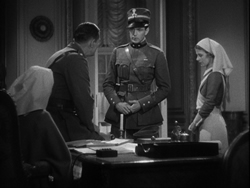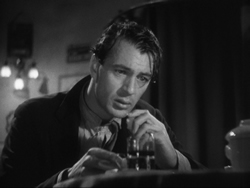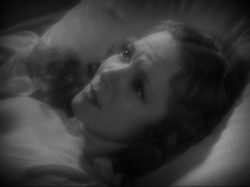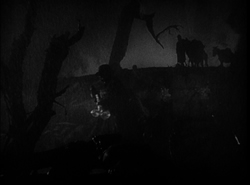
B&W, 1932, 89m.
Directed by Frank Borzage
Starring Gary Cooper, Helen Hayes, Adolphe Menjou, Mary Philips
BFI (Blu-ray & DVD) (US RB/R2 HD/PAL), Kino (Blu-ray & DVD) (US RA/R1 HD/NTSC)

B&W, 1932, 89m.
Directed by Frank Borzage
Starring Gary Cooper, Helen Hayes, Adolphe Menjou, Mary Philips
BFI (Blu-ray & DVD) (US RB/R2 HD/PAL), Kino (Blu-ray & DVD) (US RA/R1 HD/NTSC)
 Today it seems a bit surprising that the very first film ever made out of an Ernest Hemingway novel still remains one of the strongest.
Today it seems a bit surprising that the very first film ever made out of an Ernest Hemingway novel still remains one of the strongest.  As the famously headstrong author's critical and public reputation increased throughout the twentieth century, it became more difficult for filmmakers to adapt his work without the resulting films turning into somber, overly reverent social statements designed solely to court awards. The few other successes managed to tackle the source material by largely throwing it out, using the basic characters and scenario to spin out a new take ranging from both solid interpretations of The Killers to the smoky To Have and Have Not. One key to this film's success was the casting of Gary Cooper, a masculine but puppy-eyed actor whom Hemingway approved of so much he was cast again in 1943 for Universal's version of For Whom the Bell Tolls.
As the famously headstrong author's critical and public reputation increased throughout the twentieth century, it became more difficult for filmmakers to adapt his work without the resulting films turning into somber, overly reverent social statements designed solely to court awards. The few other successes managed to tackle the source material by largely throwing it out, using the basic characters and scenario to spin out a new take ranging from both solid interpretations of The Killers to the smoky To Have and Have Not. One key to this film's success was the casting of Gary Cooper, a masculine but puppy-eyed actor whom Hemingway approved of so much he was cast again in 1943 for Universal's version of For Whom the Bell Tolls.
Significantly, this was also the only pre-Code Hemingway film, and its relative candor about illicit sex and childbirth (which was apparently even more frank in earlier screenplay drafts) was a large reason it was heavily censored in most circulating prints for decades. The original novel was an unabashed anti-war statement, and while that element remains in the film, it also has a strong dose of melodramatic romance courtesy of director Frank Borzage, who had risen to fame in the silent era largely thanks to successful, stylish romantic dramas starring Janet Gaynor and Charles Farrell.
Here Cooper is cast as the jaded Frederic Henry, an American in Italy who signs up to become an ambulance driver for the military in World War I. During his service he becomes friends with an oddly controlling physician named Rinaldi (Menjou), through whom he meets and spends a torrid evening with British nurse Catherine (Hayes) after carousing impressionistically through a brothel or two. The two are temporarily separated, with fate bringing them together again after a combat explosion lands Frederic in a Milan hospital under Catherine's care. However, their happiness proves brief as the war wages on and regulations keep them from each other, with Rinaldi's interference also preventing their letters to each other from arriving safely.
The influence of German expressionism played a strong part in many of Borzage's films, and that's certainly the case here as the war scenes take on a  stylized, nightmarish appearance thanks to the canny use of models and creepy production design. On the other hand, the romantic moments are pushed to feverish heights complete with billowing fabric and dreamlike lighting, not to mention some classical music interjections that don't play quite as sincerely today thanks to decades of parodies. Both Cooper and Hayes are excellent, with the former in particular getting to show off a range often buried in his more straightforward all-American
stylized, nightmarish appearance thanks to the canny use of models and creepy production design. On the other hand, the romantic moments are pushed to feverish heights complete with billowing fabric and dreamlike lighting, not to mention some classical music interjections that don't play quite as sincerely today thanks to decades of parodies. Both Cooper and Hayes are excellent, with the former in particular getting to show off a range often buried in his more straightforward all-American  roles from the 1940s onward. Of course, Menjou gets the most colorful and complex supporting role with motivations that are still the subject of speculation among many viewers.
roles from the 1940s onward. Of course, Menjou gets the most colorful and complex supporting role with motivations that are still the subject of speculation among many viewers.
Initially released by Paramount, A Farewell to Arms was offered to American theaters with the option of Hemingway's original tragic ending or an alternate happy one. The film subsequently fell into the public domain, with unwatchably dark, tattered, edited transfers barely hinting at the original presentation. In 2013 the film's best surviving element (an uncensored nitrate print acquired by David O. Selnick when he was mounting a remake) was painstakingly restored by Lobster Films, resulting in a very impressive new HD master first released in America as a no-frills edition from Kino Lorber. That same excellent a/v quality can be found in the more lavishly-mounted BFI version, including clear PCM audio and a top-notch visual appearance. The dual-format BFI Blu-ray and DVD set also throws in an audio descriptive option and optional English subtitles, plus five video extras and a handy liner notes booklet containing a brief appreciation of the film by Geoff Andrew and a very thorough appraisal of Borzage by Kent Jones. The happy American ending is first among the supplements, followed by a 1915 newsreel, "War Scenes in Italy," depicting the state of Rome and surrounding areas during World War I. "Austrian Prisoners in a Concentration Camp" is another short film (very, very short at only 3 minutes) showing the routines of prisoners being led through Italy, while "Latest Crime of the Sinister Hun 17.6.18" is equally swift as it shows the fate of casualties at hospitals in France following an air raid. Last up is a 3-minute Lux Radio Theater interview with Borzage conducted by Cecil B. DeMille to tie in with a production of Seventh Heaven, based on one of Borzage's most popular films. A real gem of early sound cinema from one of its more overlooked maestros, it's still a vital film finally in a worthy presentation after decades of neglect.
![]()